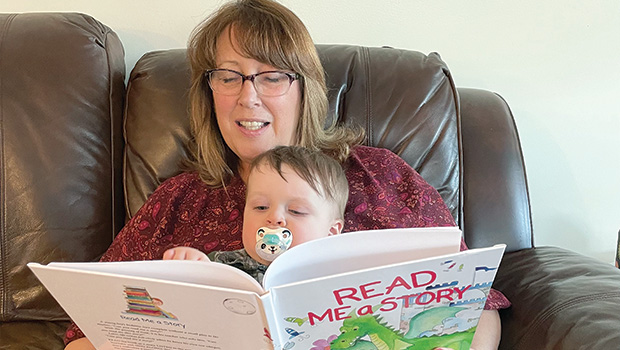Every educator who taught through the pandemic had to improvise to make instruction meaningful while keeping students safe and engaged.
For Carol Rossetti (pictured at right with her grandson), that meant singing in the cafeteria, taking the legs off a digital piano, turning a ukulele into a wearable instrument, and more.
The veteran preK–4 music teacher, who retired this summer from Mary R. Fisher Elementary School in North Grosvenordale after a career spanning nearly 37 years, says the same ingenuity that helped her reimagine her approach in the classroom led to a creative project she hopes will inspire generations to come.
From stage to page
“Every year—except for the past three, due to COVID—my school celebrated CEA’s Read Across Connecticut with a schoolwide assembly that included songs, poetry, and a read-along story,” she explains. “Years ago, I composed a song for the assembly titled, ‘Read Me a Story,’ and every year, colleagues commented that hearing students sing along to it brought tears to their eyes. So I decided to turn the song into a book.” (Listen here.)
She floated the idea by a former classmate at a high school reunion, and the two teamed up to make it happen. The classmate, an art therapist, created the book’s illustrations, and after four years in the making, the book is available at Barnes & Noble, which also offers CEA members an educator discount.
“Our local library bought several copies, I did a virtual story hour, and in April we had a book signing at my school,” Rossetti says.
Tools of the trade
While colleagues inspired Rossetti to turn her musical composition into a book, technology helped pave the way.
“During our assemblies I used PowerPoint to get my lyrics up on a screen, and seeing the words up there, I realized my book was written,” she says.
Little did she know how significant a role technology would eventually play, as schools had to pivot to remote learning.
“Like all teachers, I found myself recording lessons, putting content up in Google classroom, and using Zoom,” she recalls. “We all learned a lot of technology in the last few years.”
Returning to in-person learning was a welcome change that posed its own challenges too.
“For a while, I lost my music room and had to do music on a cart,” Rossetti explains. “I wheeled my digital piano around from classroom to classroom and had our custodians put a hook on my ukulele so that I could wear it. We did what educators do and made it work. When some of our restrictions were lifted and kids could leave their classrooms, I asked to use the cafeteria for music, since we still weren’t using it for lunch. It was great to be able to have the kids come to music again. Finally, this past school year, I had my music room back.”
Her young students, she says, were at a perfect age to participate in music. “They love music. They love to sing. And there’s no inhibition for them.”
Next chapter
Although she’s retired from the classroom and sees more book publishing in her future, Rossetti plans to stay as active as ever in her union.
“I was president of the Thompson Education Association for nine years, and I know how important it is to be involved,” she says. “I’ve participated in the CEA Representative Assembly, where my daughter sang the national anthem for the opening one year. It’s been an amazing career with amazing colleagues, and I look forward to my new CEA-Retired membership.”







